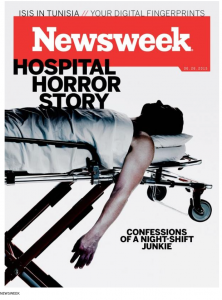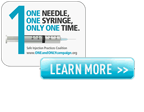Not in my backyard! – When outbreaks happen again in our own hometown

Several new investigations into healthcare associated transmission of bloodborne pathogens have been reported lately. Lauren recently reflected on an investigation into possible drug diversion by a surgical tech that could result in transmission of hepatitis C from the surgical tech to patients through reuse of syringes in the Denver area. A recent news article reported on a situation in which a nurse employed by an Omaha wellness company reused two syringes to administer 67 flu shots.
Of course we are horrified by these potential outbreaks, as we always are whenever there are reports of unsafe injection practices. Our hearts go out to those affected by the unsafe practices. We know the anxiety, anger and betrayal that many feel, because we have felt those same feelings ourselves when we contracted Hepatitis C through reuse of syringes and medication vials.
But what makes these reports of potential outbreaks even more difficult for us, is that they are linked to our own backyards.
Lauren lived in the Denver area for many years, and was affected by the Rose Medical Center outbreak through drug diversion in 2009. Evelyn lives in Fremont, NE forty miles from Omaha, and was one of 99 people who contracted Hepatitis C through reuse of syringes during chemotherapy in 2002.
Ever since we were harmed by unsafe injection practices, we have worked hard to educate about and advocate for injection safety. We have wept with victims, argued with policy makers, and encouraged healthcare providers, educators and administrators to do the right thing for many years now. The work is consuming, demanding, – but usually rewarding.
But when the outbreaks happen in our own backyard, we feel so many more emotions. Anger. Frustration. Discouragement.
Perhaps the most salient emotion is bewilderment. How can this be? Didn’t everyone read about our outbreak in the newspaper, or see a report on TV? Wasn’t everyone shocked and horrified? Didn’t we hear over and over again – “We can’t let this happen again!”
And yet it did. Of course changes were made – even sweeping changes – right after our outbreaks. We were gratified by the improvements that we saw implemented. But time moves on – people change jobs, memories dim, attention to safety is threatened by the demanding pace, or cost cutting, or a culture of poor communication within the healthcare team. And then reuse of medical equipment intended for one time use happens again, either intentionally or unintentionally.
And then we are back to where we were years ago – weeping with victims, arguing with policy makers, encouraging healthcare providers, educators and administrators – in some instances the very same officials we interacted with at the time of our outbreak.
At times like these we have to sit back, take a deep breath, and reflect on our advocacy. Are our efforts worthwhile? Should we continue? And almost immediately, the answer comes from deep within – “YES!”
For although we learn through the media for months about the number of people who were affected by unsafe injections in our hometowns, we do not know how many people we have saved from injury through our efforts. We know it is a great many. We know that the educational efforts of the One and Only Campaign and the advocacy efforts of the Drug Diversion Prevention Committee are making a difference. We know this whenever someone comes up to us after hearing us speak and tells us, “I’m taking your story back to my co-workers, and we are going to make some changes!” We carry those statements in our hearts, and bring them to the top of our minds at times like these.
So. Back to work. Lets all commit to making “One needle, one syringe, and only one time” happen everywhere in the world, not just in our own backyards.










